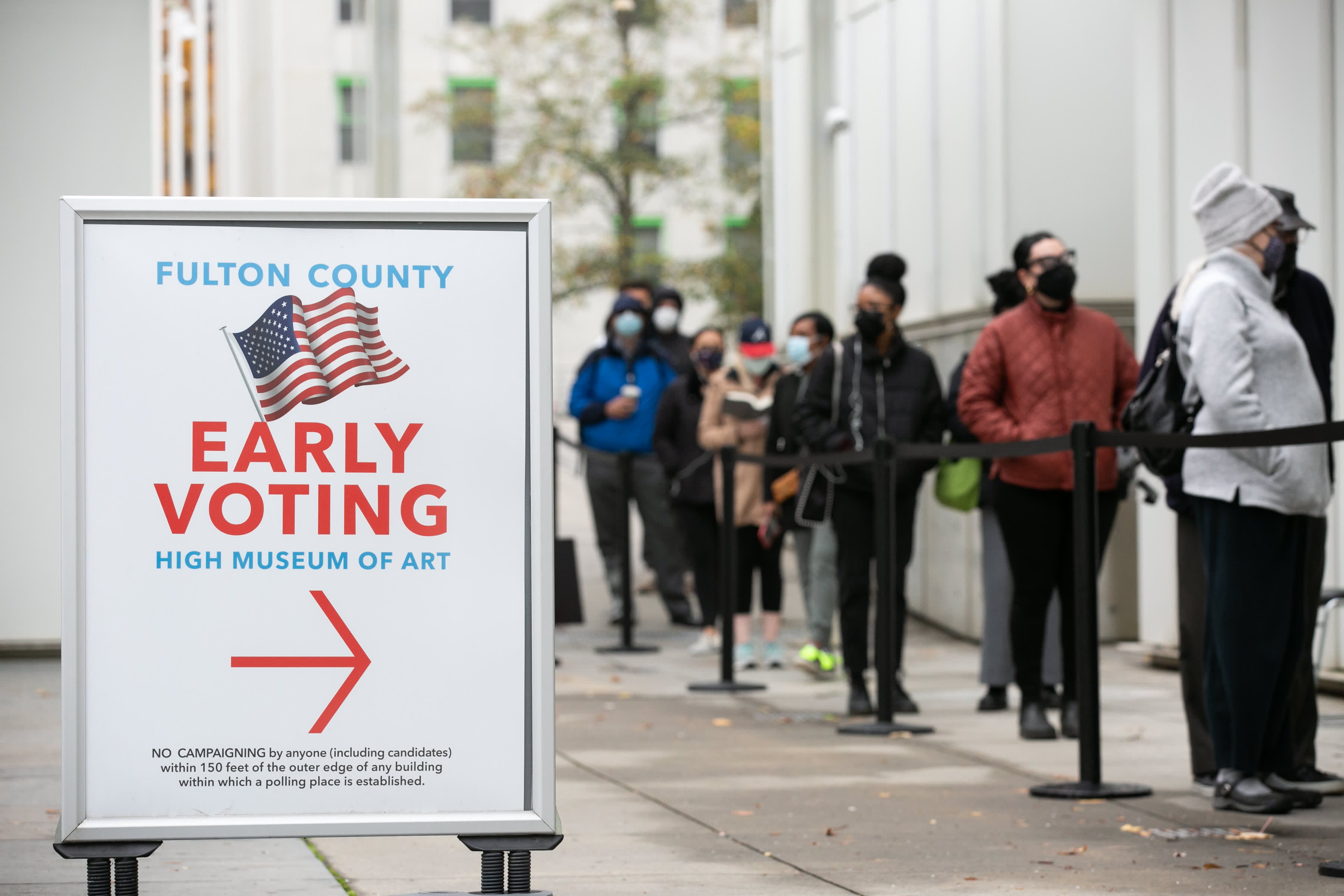
The stock market will face a big test early in 2021 with the Georgia runoffs
The Georgia Senate runoff elections are a wild card for markets in the first days of the new year, and it has the potential to reshape not only the national political agenda but also the course of the markets and the economy in the year ahead.
Two incumbent Republican senators are in a tight race to retain their own seats, but more importantly, they are battling to hold onto the Republican majority in the Senate in the Jan. 5 election. The latest Emerson College poll shows the incumbents with a slight edge each of 3 percentage points, but should both Republicans lose, each party would have 50 seats, leaving Vice President-elect Kamala Harris to break any tie in favor of Democrats.
"It's a binary event," said Ed Mills, Washington policy analyst at Raymond James.
Sen. David Perdue is being challenged by Democrat Jon Ossoff, while GOP Sen. Kelly Loeffler is running against Raphael Warnock. None of the candidates had more than 50% of the vote in the Nov. 3 vote, so Georgia law requires a runoff election between the two leading candidates for each seat.
"Anyone who says they have an honest edge understanding how this is going to turn out, I would honestly discount," said Mills. "I think structurally you would give an edge to Republicans winning at least one of the seats. With the political environment we're in, with the inaccuracy of polls over the last number of years, with a presidential election being as close as possible in a polarized environment, this easily could be that both Republicans win. It's also conceivable that both Democrats win."
Markets have reacted favorably to the current split Congress with a Democrat in the White House, trading on the view that the Senate majority would limit Democratic efforts to raise taxes and carry out some of the more progressive policies of the party. But if Democrats were to win both Georgia seats, the view is that Democrats could raise taxes but also pass a much larger stimulus package to help the economy.
Democrats have promised another stimulus package will follow the current $900 billion proposal, now under consideration in Congress.
"I think the markets are going to have the knee jerk reaction of Democrats winning the control of the Senate would be negative for the market," said Ethan Harris, head of global economic research at Bank of America. "But I think as the fiscal stimulus rolls out, and it's pretty clear you're going to be at the high end of the range, I think the market will like that. Everyone always talks about how the markets don't like a progressive agenda, but they do like fiscal stimulus."
Harris said the economy could grow faster than expected in 2021 if the next stimulus package was larger. But the U.S. would also face the longer term issue of higher debt. That could also be a negative for the bond market, which had sold off on the idea of a bump up for the economy and higher debt load when there was the potential for a Democratic sweep before the November election.
Rick Rieder, BlackRock chief investment officer of global fixed income, said the election could be one of the bigger influences on markets early in the year.
"I think it's one of the things markets will pivot to and focus on in the beginning of the month," said Rieder. "It's going to be a big contentious race, and I think it's going to be significant."
The fact that the Democrats would have a narrow edge, if they did win, could temper some of the more progressive policies, according to some analysts.
"Let's say we get a surprise, Democrats capture both seats...It's difficult to envision moderate Democrats lining up to stack the court and change filibuster rules, pass universal health care and have sweeping tax hikes.," said said Michael Arone, chief investment strategist at State Street Global Advisors.
But Mills said, like other presidents before him, President-elect Joe Biden could use budget reconciliation to make some tax law changes. President George W. Bush enacted his tax cuts that way, as did President Donald Trump. That can pass with a simple majority rather than a 60-member Senate majority.
"Taxes by far are the biggest question mark," Mills said. "Congress is not allowed to pass legislation that is retroactive with one exception. Tax bills can be."
Mills said Biden could seek tax hikes for the highest income households, and could propose a phase-in of higher corporate taxes, starting in 2021. Biden has proposed a 28% corporate tax rate, from the current 21% rate.
"One thing to watch is the financial transaction tax. The perception is since the beginning of the pandemic, Wall Street has done well, and Main Street has suffered," said Mills.
A 10% tax on transactions could generate $777 billion over a decade, he said.
Mills said Democrats would likely use the argument that Covid exposed unfairness in the system, that people need health care, a higher minimum wage and worker protections.
He expects the vote to be market moving, and should just one of the Republicans win, that would be the catalyst for a move higher for stocks.
